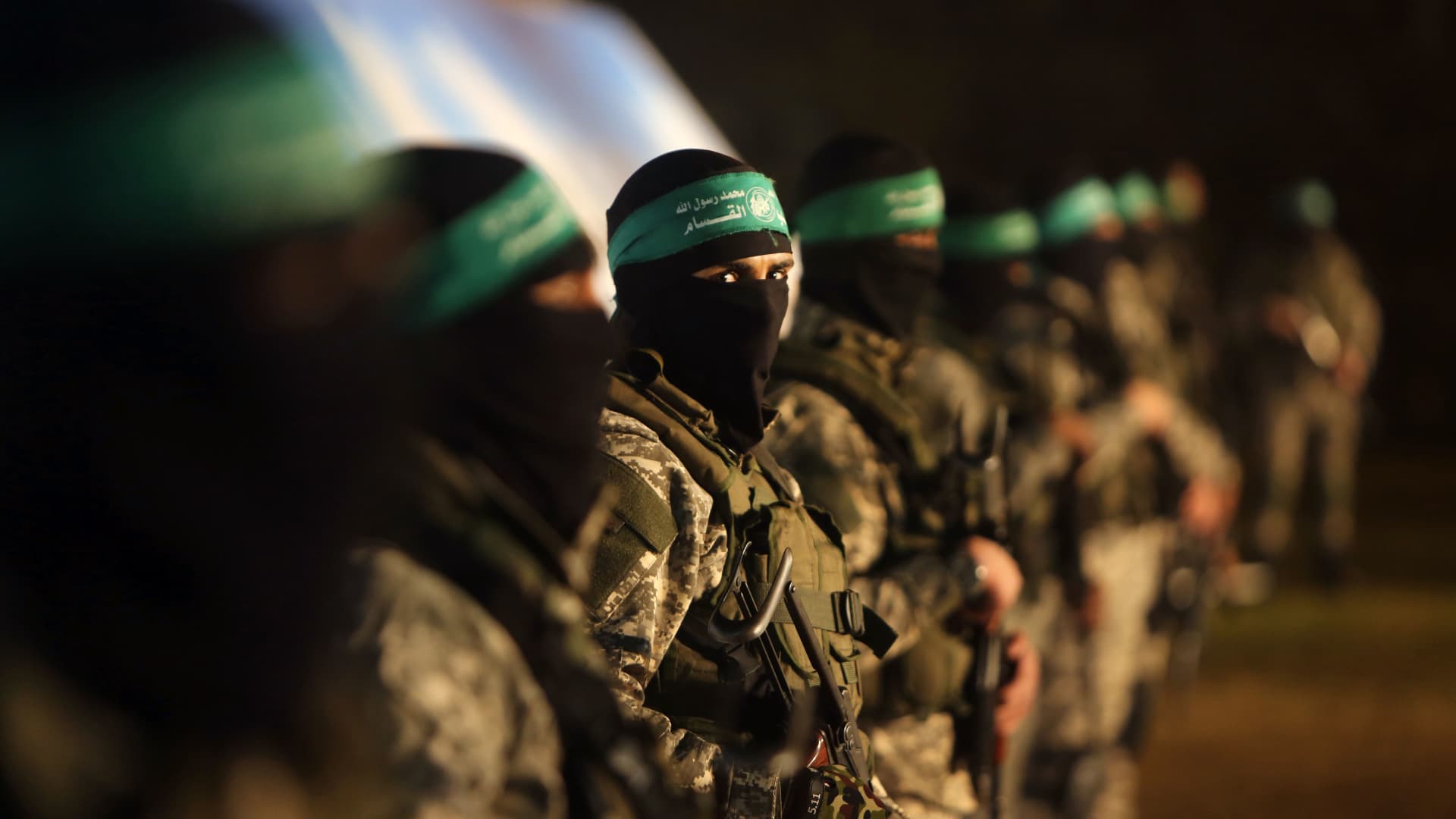Where Hamas gets its money and why it’s so hard to stop, even as the U.S. steps up efforts


Palestinian members of the al-Qassam Brigades, the armed wing of the Hamas movement, take part in a gathering on Jan. 31, 2016, in Gaza City to pay tribute to their fellow militants who died after a tunnel collapsed in the Gaza Strip.
Mahmud Hams | Afp | Getty Images
The U.S. is urgently trying to cut off funding to Palestinian militant organization Hamas in the wake of its Oct. 7 terrorist attacks, which killed 1,400 Israelis and led to the capture of more than 200 people from Israel.
As part of this effort, while Israel hammers the Gaza Strip with airstrikes, the U.S. Treasury Department’s under secretary for terrorism and financial intelligence met Wednesday with officials in Qatar.
“The U.S. is prepared to take unilateral action, but when we are strategically aligned with partners in this region, we have a great chance for success at a greater speed with more efficiency,” the official, Brian Nelson, told CNBC in a phone interview shortly after the meeting.
Nelson had a similar message for officials in Saudi Arabia, with whom he met Tuesday. He wouldn’t comment specifically on whom his office might focus on next, but the Treasury Department is hinting more action is on the way.
Still, it’s a difficult and complicated effort, given the scope and intricacy of the Hamas funding network.
A week ago, the Treasury’s Office of Foreign Assets Control, commonly known as OFAC, put sanctions on 10 institutions that fund Hamas from Gaza, the West Bank, Sudan, Turkey, Algeria and Qatar. Officials at the Treasury Department had been investigating these entities for years but didn’t kick into gear until after the brazen attacks earlier this month.
“After previous Hamas terror attacks you have big inflows to Hamas from across the globe and we wanted to act urgently to prevent that,” Nelson said, pointing to the new urgency from the U.S.
Hamas’ large funding network
U.S. officials say Hamas’ fundraising apparatus is wide. The group, which controls Gaza, receives a large part of its money through charitable organizations that sometimes also legitimately funnel aid to help civilians and civil projects in Gaza.
“Making the distinction is often hard,” said Juan Zarate, who was the first ever assistant secretary of the Treasury Department in charge of tracking and eliminating financing for terrorists.
Then-President George W. Bush appointed him in the wake of the Sept. 11, 2001, terrorist attacks on the U.S. Zarate is now the co-managing partner at K2 Strategies, where he advises clients, including governments in the Middle East, on everything from financial compliance to cybersecurity.
Speaking about Hamas, Zarate said, “over the years, they’ve been able to operate under a cloak of legitimacy in some circles as they also governed Gaza,” which put some governments, including the U.S., in a position where there was less of an aggressive appetite to go after them.
“For now, that has changed,” he said.
Palestinians, who fled their houses due to Israeli strikes, gather to get their share of charity food offered by volunteers amid food shortages, at a U.N.-run school where they take refuge, in Rafah, in the southern Gaza Strip, on Oct. 23, 2023.
Mahmoud al-Masri | Reuters
As for the U.S. not going after Hamas, Zarate said it was a question of resources, priorities and the assumption that “the Israeli government had it under control.”
Beyond money from charitable organizations, Hamas also raises funds by taxing the people of Gaza on goods made in Gaza and goods imported from outside the strip.
Iran is another major funding source for Hamas, according to officials at the Treasury and State departments.
Since Oct. 7, supporters of Israel have urged the U.S. to more forcefully monitor and intercept oil exports from Iran that the current and past administrations have allowed to go through, despite sanctions. China has been a main recipient of Iranian oil exports.
The U.S. government also has been reluctant to cut off Iran’s supply out of concern taking it off the market will boost oil prices, hurting the American and global economies.
Where the banking system comes in
Once OFAC puts an individual or institution on a designated terror funding list, it sends a flag to financial institutions across the world, including in the U.S. If a transaction is made in dollars, the path goes through an American bank.
“These additions to the list are made in real time,” according to attorney Gary Osen, who has successfully sued terror financers for aiding Hamas in the past, including the Arab Bank, based in Jordan.
When the banking system triggers an alert, it then goes to manual review.
“The system has not done enough to block money going to Hamas, not by a long shot” said Osen. He cited several organizations long suspected of funneling money to Hamas, including Turkey’s IHH Humanitarian Relief Foundation, part of the Union of Good, which the U.S. Treasury Department designated as a terrorist fundraiser in 2008. The U.S. called it “an organization created by Hamas leadership to transfer funds to the terrorist organization.”
But Turkey’s IHH was left untouched, giving it continued access to the American and global banking systems. The organization didn’t return calls or emails, but its website calls for donors to immediately raise funds for medical care, education and other projects “to meet the needs of the people in Gaza.”
“Despite the fact there is ample evidence to list IHH as a financial sponsor of Hamas terrorism, there are likely diplomatic reasons why the U.S. government hasn’t acted, including the organization’s close ties to the Turkish government, a NATO ally,” Osen said. “Governments have a lot of considerations to make and reasons to do nothing.”
Don’t miss these CNBC PRO stories:

:max_bytes(150000):strip_icc():format(jpeg)/GettyImages-80864706-af4bc38e94e34052a5106e15bf44b2a2.jpg)
:max_bytes(150000):strip_icc():format(jpeg)/GettyImages-77294443-88c7023010c9410c933c8029b3931c91.jpg)